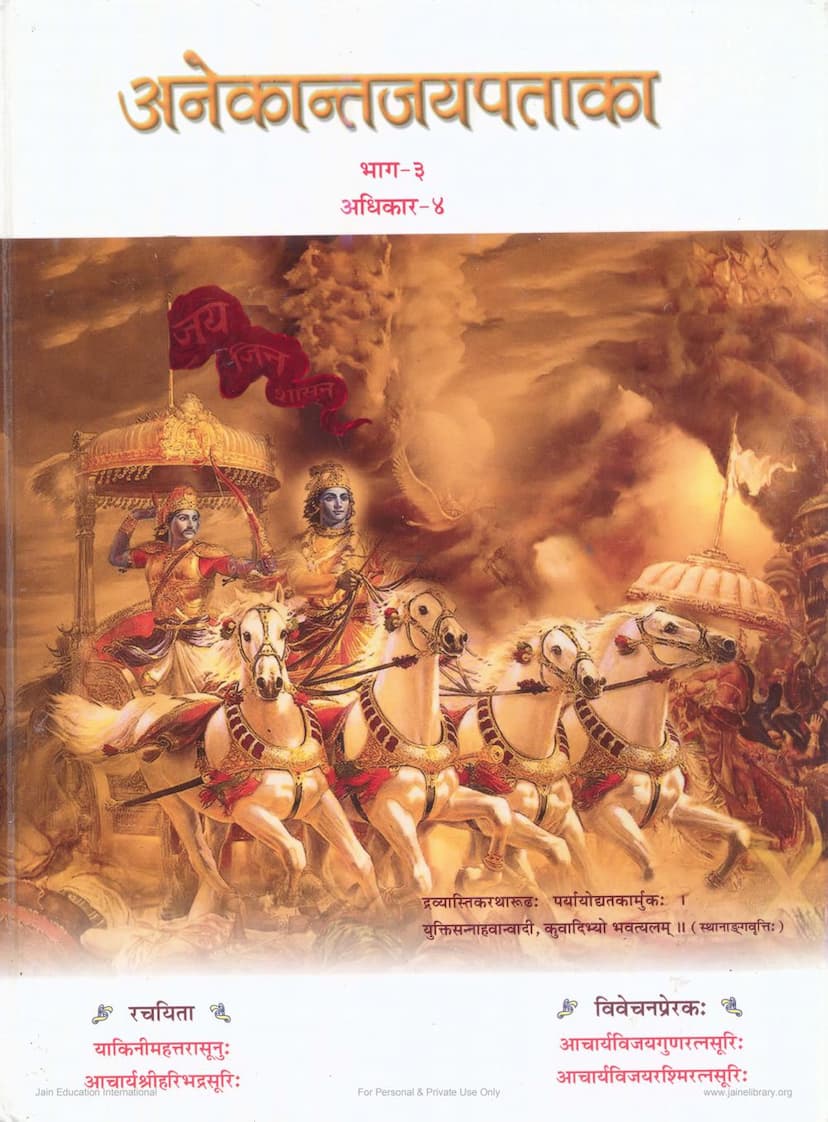Anekantjaipataka Part 03
Added to library: September 1, 2025

Summary
Here's a comprehensive summary of the provided Jain text, "Anekantjayapataka Part 03," based on the pages you've shared. Please note that the summary focuses on the content of the provided pages and the general themes they represent.
Book Title: Anekantjayapataka Part 03 Author(s): Bhavyasundarvijay, Yashratnavijay Publisher: Jingun Aradhak Trust
Overall Summary of the Provided Pages:
These pages introduce and provide commentary on the fourth chapter (Adhikara 04) of the "Anekantjayapataka," a significant Jain philosophical treatise. The chapter, and thus the text, delves into the concept of "Abhilapya-Anabhilapya Vada" (The Doctrine of Speakable and Unspeakable), which is presented as a crucial aspect of Anekantavada (the principle of manifold aspects or non-absolutism).
The text highlights the profound nature of the Jain teachings, comparing its loftiness to the Himalayas and its purity to the Ganges. It emphasizes that these teachings are a source of purification and salvation.
Key Themes and Concepts Discussed (Based on the Pages):
-
Anekantavada as the Core Principle: The overarching theme is the celebration and establishment of Anekantavada. The text posits that true understanding and liberation are found within this principle.
-
Abhilapya-Anabhilapya Vada: This doctrine, central to the chapter, explores how things can be both speakable (Abhilapya) and unspeakable (Anabhilapya) depending on the context, perspective, or the precise words used. The text clarifies that it's not about speaking everything, but about speaking what is appropriate, beneficial, and truthful at the right time to the right person, in the right manner, and according to scripture.
-
Critique of Ekantavada (One-Sided Views): The text promises a thorough review and refutation of one-sided philosophical systems, specifically mentioning Buddhism (Bauddha) and Vaisheshika (Vaisheshika) philosophies. It aims to dismantle their absolutist claims with logical arguments.
-
The Nature of Words and Meaning: A significant portion of the provided text (especially pages 16-21) delves into the philosophical debate about whether words refer to ultimate reality (Vastu) or conceptual distinctions (Apoha). The text engages with the Buddhist perspective that words refer to Apoha (exclusion or negation) rather than the actual object. It argues against this, emphasizing the "Arthavachakata" (meaningfulness or denotative power) of words, which is seen as dependent on the psycho-physical faculty (Kshayopashama) and ultimately grounded in reality.
-
Rejection of Nihilistic and Absolutist Views: The text strongly refutes extreme positions like the Buddhist view of emptiness (Shunyata) and the idea that words only refer to conceptual exclusions (Apoha).
-
The Role of Kshayopashama: The text highlights that the Kshayopashama (the partial destruction and subsidence of karmic obstructions) is crucial for understanding and experiencing reality, and it's this faculty that enables the accurate perception of meaning through words.
-
The Importance of Context and Perspective: The concept of "Aparikshita" (unexamined) and the nuances of "Anekant" are brought forth to demonstrate how a single subject can be understood from multiple viewpoints.
-
Illustrative Examples: The text uses examples like "Sakal Vastu" (all things are existent in some aspect) and "Kamalaprabhacharya" (a sage who wisely chose not to speak about the Jin Alayale) to illustrate the principle of speaking appropriately and the wisdom behind what is speakable and what is not.
-
Rejection of Nihilistic Views on Reality: The text argues against the notion that reality is ultimately non-existent or solely dependent on conceptual distinctions (Apoha). It emphasizes that reality has a substantive existence, even if it is understood through various anekant perspectives.
-
The Structure of Argument: The text demonstrates a rigorous dialectical approach, presenting a "purvapaksha" (opponent's view) and then systematically refuting it with "uttarapaksha" (rejoinder) and logical reasoning.
-
Emphasis on Jain Principles: The work is firmly rooted in Jain philosophy, advocating for the supremacy of Anekantavada, the importance of scripture (Agam), and the ultimate goal of Moksha (liberation) attainable through understanding and practicing these principles.
In essence, the provided pages from "Anekantjayapataka Part 03" lay the groundwork for a deep dive into the Jain doctrine of speakability and unspeakability, using rigorous logic to dismantle opposing philosophies and affirm the multifaceted, nuanced, and ultimately salvific nature of Anekantavada. The text is presented with extensive commentary and analysis by Acharya Vijaygunratnasuri and Acharya Vijayrashmiratnasuri, with contributions from Muni Bhuvasundarvijay and Muni Yashratnavijay, under the guidance of esteemed Acharyas.